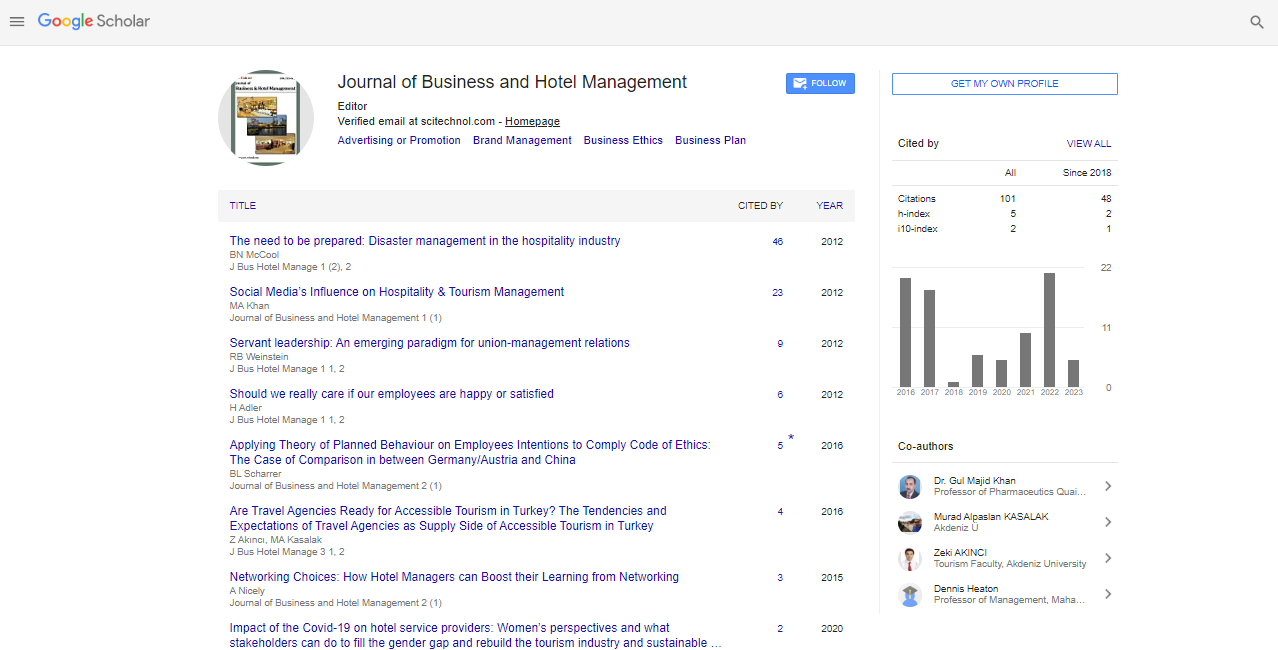Commentary, J Bhm Vol: 9 Issue: 2
Mastering Brand Management: Creating and Nurturing Lasting Brand Equity
Graeme Steve*
Department of Business and Management, Vin University, Hanoi, Viet Nam
*Corresponding Author: Graeme Steve
Department of Business and
Management, Vin University, Hanoi, Viet Nam
E-mail: steveg56@gmail.com
Received date: 15 May, 2023, Manuscript No. JBHM-23-108249;
Editor assigned date: 17 May, 2023, PreQC No. JBHM-23-108249 (PQ);
Reviewed date: 31 May, 2023, QC No. JBHM-23-108249;
Revised date: 08 June, 2023, Manuscript No. JBHM-23-108249 (R);
Published date: 16 June, 2023, DOI: 10.4172/2324-9129.1000144
Citation: Steve G (2023) Mastering Brand Management: Creating and Nurturing Lasting Brand Equity. J BHM 9:2.
Description
Brand management is a strategic process that involves producing, developing, and nurturing a brand to establish a strong and positive identity in the minds of consumers. It goes beyond just designing logos and slogans; it encompasses the entire experience that customers have with a brand, including their emotional and psychological connection to it. In this article, we will explore the various aspects of brand management and how it plays an essential role in the success of businesses.
Brand equity is the intangible value that a brand holds in the marketplace. It represents the perceptions, attitudes, and feelings that consumers associate with the brand. High brand equity means that consumers have a strong preference for the brand, are willing to pay a premium for its products or services, and are more likely to remain loyal over time. Brand managers work diligently to build and maintain brand equity, as it directly impacts the company's bottom line and market competitiveness.
A brand's identity is its unique personality and set of values that differentiate it from competitors. Brand managers collaborate with marketing teams and other stakeholders to define the brand's mission, vision, purpose, and positioning in the market. They carefully craft brand guidelines that dictate the brand's visual identity, tone of voice, and messaging to ensure consistency across all communication channels.
A robust brand strategy involves comprehensive market research and analysis. Brand managers identify target audiences, analyze competitors, and assess consumer behavior to create a strategic plan that guides brand positioning and marketing efforts. The brand strategy serves as a roadmap for future initiatives and helps align the organization towards a unified brand vision.
Brand awareness is the level of familiarity consumers have with a brand. Brand managers use various marketing tactics, such as advertising, content marketing, social media, and public relations, to increase brand visibility and recognition. They aim to create memorable brand experiences that leave a lasting impression on consumers.
Brand image refers to the overall perception of a brand by its customers and the general public. It is shaped by the brand's reputation, customer service, product quality, and social responsibility efforts. Brand managers continuously monitor and manage the brand's image, taking proactive steps to address any negative feedback or publicity that could harm the brand's reputation.
Brand loyalty is the result of successful brand management. Loyal customers are not only repeating buyers but also brand advocates who enthusiastically recommend the brand to others. Brand managers focus on providing exceptional customer experiences, personalized interactions, and loyalty programs to foster strong relationships with customers.
The marketplace is dynamic and subject to constant changes. Successful brand management requires adaptability and the ability to respond quickly to shifting consumer trends, technological advancements, and competitive landscapes. Brand managers stay vigilant and agile, adjusting their strategies to stay relevant and meet evolving consumer demands.
In today's digital age, online presence and digital branding are precarious components of brand management. Brand managers harness the power of social media, content marketing, influencer partnerships, and search engine optimization to connect with audiences and amplify their brand message.
Conclusion
Brand management is an intricate process that demands both creativity and data-driven decision-making. By building and sustaining brand equity, businesses can gain a competitive advantage, create long-term customer loyalty, and drive sustainable growth. Successful brand management not only ensures a robust brand identity but also fosters meaningful connections between brands and consumers, making it an indispensable part of modern marketing strategies.
